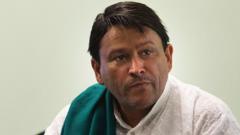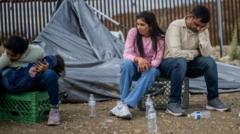The decision to back claims of unjust discrimination against Afrikaners by the Trump administration raises questions about racial dynamics in South Africa post-apartheid.
Trump Administration Signals Support for Afrikaners' Claims of Persecution

Trump Administration Signals Support for Afrikaners' Claims of Persecution
U.S. executive order halting aid to South Africa and providing refuge for Afrikaners sparks controversy.
In a controversial move, President Trump recently issued an executive order that has sent ripples across South Africa and beyond. The directive puts forth U.S. support for claims made by some Afrikaners — a group descending from European settlers — who argue they are victims of unjust racial discrimination in contemporary South Africa. This comes after decades of efforts by parts of this minority to frame themselves as the true victims of post-apartheid conditions.
Trump’s executive order, which includes a provision for Afrikaners to be considered refugees in the U.S. and a simultaneous halt to American aid to South Africa, has been viewed at home and abroad as a contentious endorsement of what many see as exaggerated or unfounded claims. The order was met with criticism in South Africa, particularly among the Black majority — the descendants of communities that were marginalized under apartheid. These critics highlight that, despite instances of violence faced by some white farmers, data indicates that these incidents represent a minor aspect of the nation's broader crime statistics.
In fact, the narrative proffered by some Afrikaners has gained traction primarily through platforms that promote their plight, often overlooking historical contexts of systemic oppression faced by Black, Colored, and Indian communities. These groups continue to confront significant socioeconomic disparities that persist as legacies of apartheid, complicating the narratives posited by Afrikaner activists.
As the debate unfolds, the political and social ramifications of this executive order will likely play out not only within the borders of South Africa but also in the international community, as nations respond to the implications of U.S. foreign policy on global racial and social issues.
Trump’s executive order, which includes a provision for Afrikaners to be considered refugees in the U.S. and a simultaneous halt to American aid to South Africa, has been viewed at home and abroad as a contentious endorsement of what many see as exaggerated or unfounded claims. The order was met with criticism in South Africa, particularly among the Black majority — the descendants of communities that were marginalized under apartheid. These critics highlight that, despite instances of violence faced by some white farmers, data indicates that these incidents represent a minor aspect of the nation's broader crime statistics.
In fact, the narrative proffered by some Afrikaners has gained traction primarily through platforms that promote their plight, often overlooking historical contexts of systemic oppression faced by Black, Colored, and Indian communities. These groups continue to confront significant socioeconomic disparities that persist as legacies of apartheid, complicating the narratives posited by Afrikaner activists.
As the debate unfolds, the political and social ramifications of this executive order will likely play out not only within the borders of South Africa but also in the international community, as nations respond to the implications of U.S. foreign policy on global racial and social issues.



















